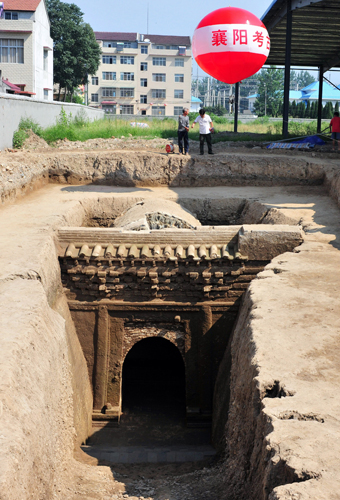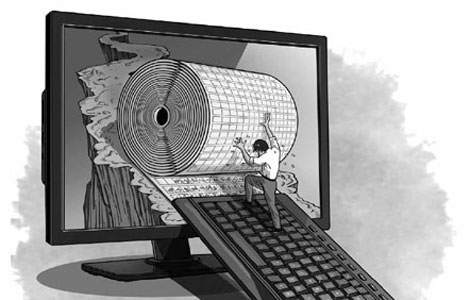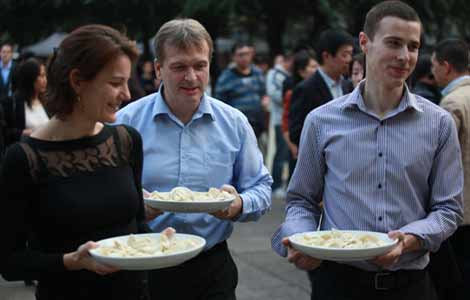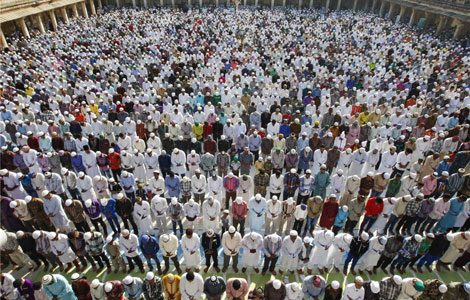The dirt on tomb raiders
Updated: 2013-10-18 09:19
By Zhao Xu (China Daily)
|
|||||||||||
 |
|
|
Archeologists in race to save historic resources from plunder, Zhao Xu reports in Beijing.
For Qu Linxia, an archeologist who specializes in the excavation of ancient tombs, the time between the discovery of a centuries-old burial site and completion of its excavation is an emotional roller coaster.
"Sometimes my heart begins to sink even before we start digging," she said, referring to the sight of disturbed earth and discarded cigarette butts that almost unquestionably point to visits by tomb raiders.
But what Qu described as her "almost foolish optimism" keeps her hopes alive as she and her colleagues at the Shaanxi Provincial Archeological Institute carefully approach the core of each tomb.
"Usually, what we discovered was what we most feared: the lid of the coffin would be pushed aside, shards of pottery were scattered all around, embossed bricks that had prevented seepage for eons were broken or missing" said the 53-year-old, who as a youngster often accompanied her archeologist father to tomb sites, before taking on his mantle at the age of 16.
"On one occasion, we were greeted by nothing but a half-drunk bottle of mineral water."
The sight of the bottle, left behind as the raiders beat a hasty retreat, effectively ended a physically and mentally consuming process for Qu by extinguishing the faint glimmer of hope she had kept alive until then.
Army of grave robbers
The past two decades have seen more than 200,000 ancient graves plundered, many of which housed the remains of successive generations of emperors, kings and feudal lords. Nationwide, the army of tomb raiders is estimated at 100,000.
Arriving at a site hot on the heels of the archeological team, the raiders enter themselves in a race against their "official counterparts", one with which Wang Genfu, former director of the archeological team of the Nanjing Museum, is all too familiar.
"There were extreme cases when we dug from one side of a site while tomb raiders dug from the other. It wasn't unusual to wake in the morning only to discover that the tunnel we'd worked on the previous day had been advanced by another couple of meters," said Wang.
"We considered ourselves extremely lucky if our 'nighttime helpers' had failed to reach the tomb chambers."
It would be wrong to think of tomb raiders as a band of ill-educated, money-minded outlaws who use primitive methods to try and make the most of an archeological discovery.
Equipped with metal-detectors, oxygen-generators and a reasonable amount of professional knowledge, modern-day tomb raiders are entirely capable of striking out on their own. Their efficiency and the level of destruction they wreak on the sites enrages and saddens the archeologists.
Related Stories
Ancient tombs unearthed in north China 2013-10-11 15:39
Developers raze ancient tombs 2013-06-17 10:53
20 ancient tombs unearthed in SW China 2013-05-25 15:47
Damage reported at Ming Tombs 2013-05-02 14:55
Rare wares from Han Dynasty grave 2013-10-11 17:28
Three archeological areas become national key cultural units 2013-05-16 17:27
Today's Top News
Xi: Expand Australia ties
Chinese millennials worried about finances
Investigation to diagnose nation's TCM resources
Elderly group sorry about roles in turmoil
Cartoon featuring Xi shows how to be president
US not budging on its arms restrictions on China
Beijing criticizes Abe's shrine offering
UK hails Chinese nuclear investment
Hot Topics
Lunar probe , China growth forecasts, Emission rules get tougher, China seen through 'colored lens', International board,
Editor's Picks

|

|

|

|

|

|





